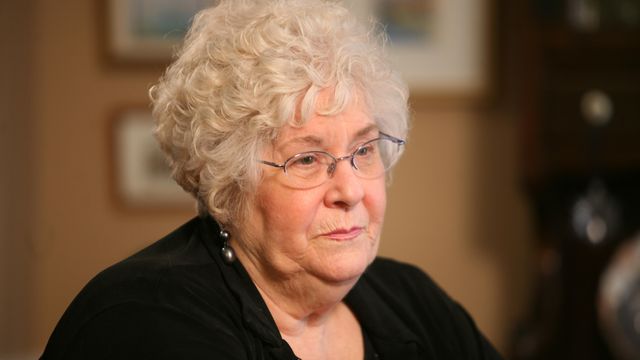Meningitis survivor: 'We're killing our own people'
Ginny Rauch thought she was going to die. The pain in her legs and back was so excruciating that she could hardly breathe at times. A steroid shot that was supposed to ease her back pain had instead left her with a near-fatal case of fungal meningitis.
Posted — Updated“When I heard what happened to all these people, I could just not believe that this had happened, because it’s cleanliness,” Rauch said. “If they had done what they said they were going to do, this would’ve never happened.”
Rauch was one of the lucky ones 10 years ago. She survived, while two other North Carolinians died. The 71-year-old former Raeford music teacher, who now lives in Virginia, says she is on a mission to hold the Food and Drug Administration accountable for the tainted medicine, even if that means speaking before Congress.
“I just don’t feel that we should ever have to have this conversation again. To me, it’s ridiculous. It’s absolutely ridiculous,” Rauch said. “We’re killing our own people in the United States from filth.”
A Spartanburg, S.C., pharmacy manufactured the tainted medicine that sickened Rauch and killed two others. The current meningitis cases stem from a specialty pharmacy in Framingham, Mass.
In both cases, the shots came from compounding pharmacies. Compounding, which involves making a special order for an existing drug, is something all pharmacies do. Pharmacy experts say special orders aren’t the problem. The problem is when pharmacies start mass producing those special orders for the public, instead of just for one patient.
“It’s hard not to attribute this to greed, simple greed,” said Jay Campbell, executive director of the North Carolina Board of Pharmacy, which inspects pharmacies. “The issue is where is the line between legitimate compounding pharmacies and full-blown manufacturing?”
Campbell says big compounding companies can sell drugs for less. They need FDA inspection but often operate in a gray area and avoid the type of oversight Campbell thinks they need.
The FDA released a statement to WRAL Investigates, saying that its "regulatory authority over compounding pharmacies is more limited by statute than it is for typical drug manufacturers."
"Compounding pharmacies and pharmacists are responsible for the quality and safety of the drugs they produce for patients. The FDA will continue to act within its existing authorities to protect public health and help ensure the safety of medical products," the FDA's statement continued.
"Once the immediate crisis is contained, the FDA is committed to working with Congress, compounders, the states, and all other stakeholders to strengthen the system to prevent tragedies like this from happening again."
Inspectors struggle to visit clinics regularly
In North Carolina, eight state inspectors cover 1,600 pharmacies across the state, 40 to 50 of which specialize in compounding. At that rate, it takes two to three years to do routine visits for each.
Compounding pharmacies are regulated by state boards of pharmacy and are exempt from FDA regulations. The FDA regulates only the ingredients.
The WRAL Investigates team examined two years of state inspections for all North Carolina pharmacies and found no major problems. However, inspectors noted several times that compounding areas needed to be cleaned better to avoid cross contamination of drugs. Inspectors also found a lot of expired drugs still on shelves.
FDA inspectors struggle with resources for routine inspections as well.
Federal authorities are still searching for Dushyant Patel, the company’s former president and chief executive, who was indicted on 10 federal charges, including fraud and selling adulterated medical devices. Authorities said in 2010 that he might have fled to his native India.
Rauch: ‘I could barely walk’
Meningitis is the swelling of the protective membranes, or meninges, covering the brain and spinal cord. The swelling is usually caused by an infection with a bacteria or virus, but meningitis can also be caused by a fungus, according to the Centers for Disease Control and Prevention.
Someone with fungal meningitis may experience a few mild symptoms at first, such as a headache, some nausea and light sensitivity. The pain can then increase to a worsening headache, stiff neck, weakness or numbness in parts of the body, slurred speech and increased pain, redness or swelling at the injection site.
Rauch says she experienced some of those symptoms after receiving a contaminated injection in her spine at a Pinehurst clinic in 2002. She received the shot to help ease her back pain from a 1993 fall on the ice.
“It’s an elective thing when you get the shot, but they helped immensely,” Rauch said. “They help a lot of people, and I wouldn’t want people to never get those shots again.”
The shot, which Rauch says is similar to getting an epidural, is inserted into the spine and numbs the area. Instead of feeling relief, the then 61-year-old felt something different.
“I could feel my neck stiffen, and I could barely walk. The next week, they diagnosed me with meningitis,” she said. “If I’d waited another week, I wouldn’t have made it.”
Ten years later, Rauch says she still has side effects, such as not being able to control her hands like she used to, making it nearly impossible for her to play her beloved piano. Despite her medical struggles, the former music teacher remains optimistic and says she can’t stop thinking about the people struggling in the latest meningitis outbreak.
“I know what these people are feeling,” she said. “Of those who have it now, just don’t give up. Just don’t give up.”
• Credits
Copyright 2024 by Capitol Broadcasting Company. All rights reserved. This material may not be published, broadcast, rewritten or redistributed.






